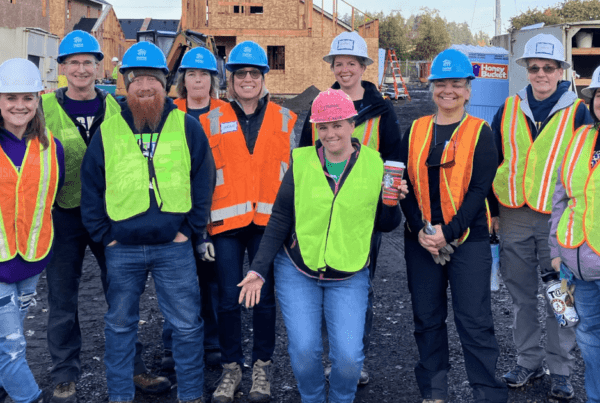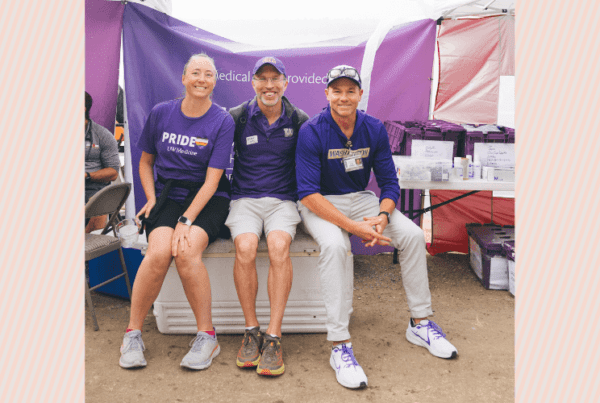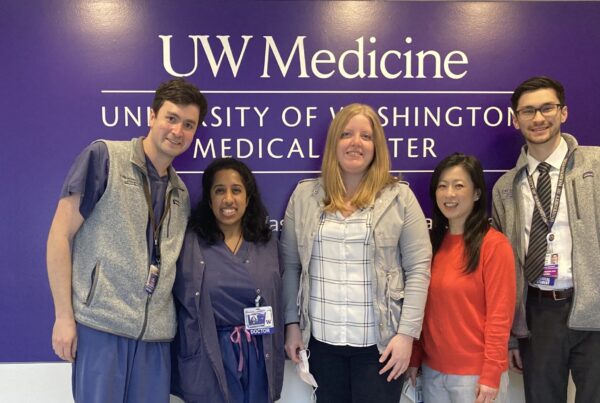Highlights | Walk to support research and honor loved ones
- Join colleagues, family and friends for the annual Puget Sound Heart & Stroke Walk.
- The walk raises money for research and activities supporting healthier communities.
- This year, participants will walk in a park, their neighborhoods or wherever they choose.
- Commit to walking and raising funds at the American Heart Association website.
The call came early on September 11, 2019. Joe Karduck, a contact center leader who was only 44 years old, had died suddenly, leaving a wife and young daughter. The cause: a heart attack.
People were stunned and heartbroken, recalls Carrie Priebe, senior director, Enterprise Access & Innovation. Searching for a way to honor Karduck and channel their grief, the staff quickly formed “Team Karduck” for that October’s Puget Sound Heart & Stroke Walk.
More than 70 co-workers joined Team Karduck and raised $11,320 to benefit the American Heart Association’s research, education and other critical work.
“It was a way for us to come together and celebrate Joe’s life and support his wife and his daughter,” Priebe says.
UW Medicine has a long history of working with the American Heart Association to prevent, treat and cure heart disease and stroke, which remain two of the leading causes of death in the United States.
Priebe and others at UW Medicine act as volunteer team leaders for the annual Puget Sound Heart & Stroke Walk. They recruit co-workers, family and friends to participate in the walk.
A different kind of heart walk
While previous Heart & Stroke Walks have been held in person, this year’s event will be a little different for safety. Participants will walk in their neighborhoods, a park or wherever they choose on Oct. 9 to raise critically needed funds.
The walk supports research, including $4.7 million in current support for cardiac research at UW Medicine, says Jessica Westhoff, senior director, Heart & Stroke Walk with the American Heart Association.
In 2019, the Puget Sound walk raised more than $1.4 million through sponsorships (UW Medicine is a longtime sponsor) and team fundraising. The pandemic dampened last year’s participation, but the walk still raised more than $1 million, Westhoff says.
Team leaders say memories of loved ones lost to heart disease or stroke prompt them to walk and recruit co-workers, family and friends. Others are motivated to give back for lifesaving cardiac treatment they or a loved one received. And some walk to support UW Medicine patients. Below are more of their stories.
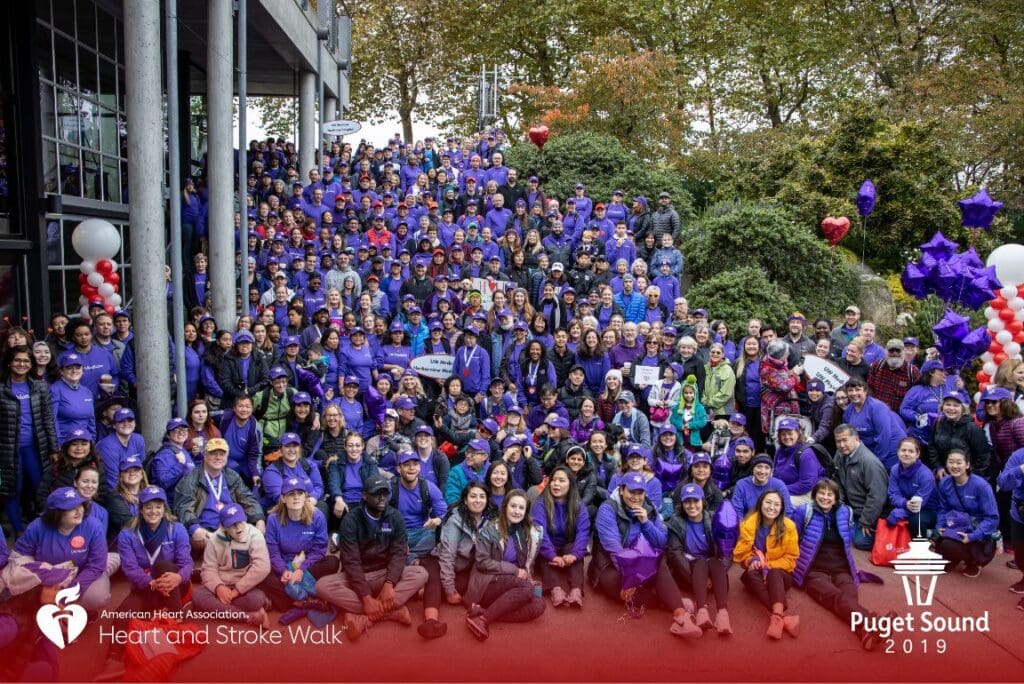
UW Medicine participants of the 2019 Heart & Stroke Walk.
Honoring loved ones who had heart disease and stroke
Theresa Pham, BSN, RN, is an assistant nurse manager in the Neuroscience Unit at Harborview Medical Center. She says her love of inpatient care work motivated her to form Heart Walk teams for the past six years. And the cause is personal: Pham’s mother died of a stroke and her father of heart disease, about 100 days apart.
Pham reaches out to co-workers, retired former co-workers, family, friends, “even my dentist,” to encourage them to join her. She’s set a team goal to raise $2,000 this year.
“I’m very motivated to reach out (to people),” she says. “It’s a lot of fun.”
Sarah Dean, BSN, RN, who works at Harborview, forms the “Walking with Jeanne” team to honor the memory of her mother, Jeanne Dean, an attorney who was outwardly healthy but died of a heart attack at age 63 in 2017.
“I’ve had so many people reach out to me, and I found out just how many people heart disease affects,” Dean says.
Chris Tharpe, retail manager at Harborview, says he’s been “overwhelmed and overjoyed” to have so many co-workers join his Heart Walk team.
“One of the reasons I like doing it is, as an African American, I have had many family members who passed away from heart disease and stroke,” says Tharpe. Those family members include his grandmother, Irene Tharpe, who raised him. “Her last wishes were for me to do something to help cure this disease.”
A survivor walks in tribute to those who cared for him
George Ott, director and site lead in Supply Chain Management at Harborview, was diagnosed at age 35 with an atrial septal defect (ASD) and a prolapsed mitral valve.
That was more than 15 years ago. Recently, doctors have also diagnosed Ott with congestive heart failure. He underwent a cardioversion ablation and now has a pacemaker.
“We’ve got great physicians here at UW Medicine, and I like to give back to the people who have taken such good care of me,” says Ott, who has led Heart Walk teams for three years.
Walking to support UW Medicine patients
Tricia O’Donohue, MPH, BSN, RN, is the service line administrator for the Neurosciences Institute. She began being a team leader for the Heart Walk several years ago. “It’s a great way to support our patients,” O’Donohue says. She likes that the American Heart Association educates people about the warning signs of stroke and the need to seek emergency care.
When you walk, you support healthier communities
Are you ready to walk? Join a team or start one! The Heart Walk mobile app helps walkers raise funds and participate in activity challenges.
The need is as strong as ever. The Heart Association, for example, supports research into the effects of COVID-19 on cardiac health, Westhoff says. Other activities supported by Heart Walk fundraising include:
• Community cardiopulmonary resuscitation (CPR) training
• Programs addressing community health issues such as food security and housing equity
• Public education about heart health and stroke awareness
As Dean says, leading a team and walking for heart health “is something we can do to be active, bring awareness, honor our loved ones and contribute to an organization that promotes the advancement of cardiac care.”
To create or join a team, please sign up at UW Medicine Heart and Stroke Walk or visit the American Heart Association website for more information on the 2021 Puget Sound Heart and Stroke Walk. Download the Heart Walk app from the iTunes and Google Play app stores.
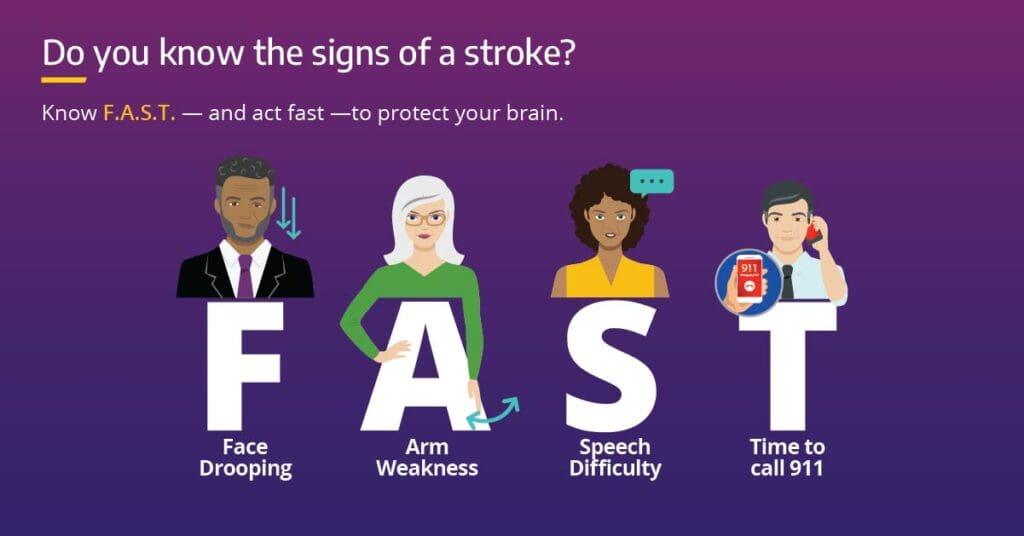
It’s important to know the signs of stroke.
Opening photo caption: Team Karduck at the 2019 Heart & Stroke Walk.
